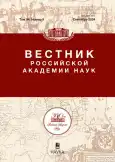Corpus linguistics nowadays
- Authors: Plungian V.A.1,2
-
Affiliations:
- Vinogradov Russian Language Institute of the Russian Academy of Sciences
- Institute of Linguistics of the Russian Academy of Sciences
- Issue: Vol 94, No 9 (2024)
- Pages: 787-794
- Section: С КАФЕДРЫ ПРЕЗИДИУМА РАН
- URL: https://journals.eco-vector.com/0869-5873/article/view/659741
- DOI: https://doi.org/10.31857/S0869587324090018
- EDN: https://elibrary.ru/FCHMFE
- ID: 659741
Cite item
Abstract
The article proposes a general presentation of corpus linguistics, its history, its methodology and its influence on current views on how a language must be studied – the process which is usually referred to as “corpus revolution”.
Full Text
About the authors
V. A. Plungian
Vinogradov Russian Language Institute of the Russian Academy of Sciences; Institute of Linguistics of the Russian Academy of Sciences
Author for correspondence.
Email: plungian@iling-ran.ru
академик РАН, заместитель директора по научной работе; заведующий сектором типологии
Russian Federation, Moscow; MoscowReferences
- Plungian V.A. Corpus as a tool and as an ideology: on some lessons of modern corpus linguistics // Russian language in scientific coverage. 2008, no. 2 (16), pp. 7–20. (In Russ.)
- Plungian V.A. On the prospects of modern corpus linguistics // Proceedings of the Department of Historical and Philological Sciences of the Russian Academy of Sciences / Ed. by V.A. Tishkov. Moscow: Nauka, 2016. Pp. 128–132. (In Russ.)
- Abroskin A.A. Corpus search: problems and methods of their solution // National Corpus of the Russian language: 2006–2008. New results and prospects / Ed. by V.A. Plungian. St. Petersburg: Nestor-Istoriya, 2009. Pp. 277–282. (In Russ.)
- Čermák F. Today’s corpus linguistics: Some open questions // International journal of corpus linguistics. 2002, vol. 7, pp. 265–282.
- McCreight K., Chvany C.V. Geometric representation of paradigms in a modular theory of grammar // Paradigms: The economy of inflection. Berlin: Mouton de Gruyter, 1991. Pp. 91–112.
- Plungian V.A. The geometry of Russian inflection: on traditional and non-traditional declension tables // Zbornik Matice Srpske za Slavistiku. 2021, vol. 100, pp. 187–203. (In Russ.)
- Barlow M. Ten lectures on corpora and cognitive linguistics. Leiden: Brill, 2023.
- Hollmann W.B. Generative vs. usage-based approaches to language // Introducing linguistics, ch. 25. London: Routledge, 2022.
- MacWhinney B. Emergentist approaches to language // Frequency and the emergence of linguistic structure (Typological studies in language 45). Amsterdam: John Benjamins, 2001. Pp. 449–470.
- Bybee J. Language, usage and cognition. Cambridge: Cambridge University Press, 2010.
- Kortmann B. Reflecting on the quantitative turn in linguistics // Linguistics. 2021, vol. 59, pp. 1207–1226.
- Ershov A.P. The machine fund of the Russian language (external formulation of the question) // Voprosy Jazykoznanija. 1985, no. 2, pp. 51–54. (In Russ.)
- Andryushchenko V.M. The concept and architecture of the Machine Fund of the Russian language. Moscow: Nauka, 1989. (In Russ.)
- Apresyan Yu.D. Integral description of language and explanatory dictionary // Voprosy Jazykoznanija. 1986, no. 2, pp. 57–70. (In Russ.)
Supplementary files










